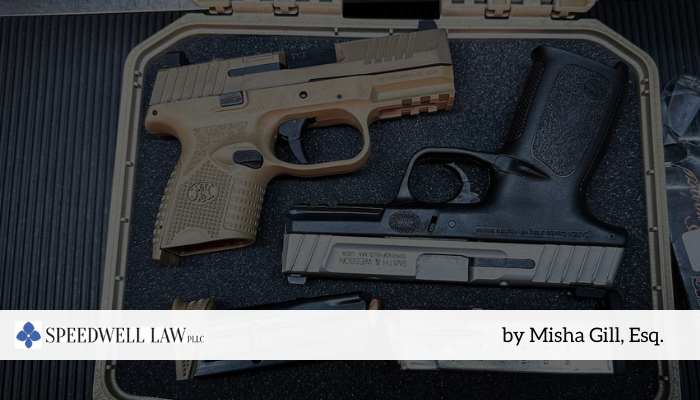
What To Do If Your Deceased Loved One Owned Firearms
The United States has seen the proliferation of firearms over the years, with millions of them scattered across homes. If you are faced with the task of handling the affairs of a deceased loved one who owned firearms, it is essential to navigate this situation carefully. In this article, our Virginia estate planning attorneys guide you through the process of inheriting firearms and ensuring they are handled legally and responsibly.
Find Out Who is Legally Authorized to Take Possession of the Firearms
The first step is to determine if your deceased family member left a will or trust that designates someone to manage their estate. If such documents exist, locate them promptly and identify the appointed executor or trustee. If you are not the designated person, contact them immediately and inform them about the firearms. Encourage them to take the necessary steps to secure these assets.
If you are the nominated individual in the estate planning documents, check if your deceased loved one transferred the firearms to a trust. Many estate plans involve the transfer of personal property, including firearms, into a trust. If such a document exists, and it indicates that the firearms belong to a trust, you will usually be legally authorized to take possession of them for safekeeping and future transfers.
Know Who Cannot Legally Take Possession of a Firearm
Federal law prohibits some individuals from possessing firearms under any circumstances, even if they are acting as fiduciaries for an estate or trust that owns firearms. These include individuals who have been convicted of a crime punishable by imprisonment exceeding one year, fugitives from justice, unlawful users of controlled substances, and others.
Virginia state laws can also impose additional restrictions. It is, therefore, essential to consult with an attorney who has knowledge of both the federal and state laws regarding firearms possession and transfer, and who can provide sound legal guidance. Failure to comply with these laws can result in severe penalties, including imprisonment.
Secure The Firearms Safely
Ensuring the safety of the firearms is very important. If they are not already stored in a secure gun safe that can deter theft, take immediate action to secure them. Unsecured firearms in an unoccupied residence can attract burglars. The theft of these guns could lead to serious consequences, including potential civil damages or criminal liability for failing to secure them adequately.
Consider transferring the firearms to someone with a Federal Firearms License (FFL). An FFL holder can legally take possession of various firearms as well as accessories like silencers. FFL holders have the authority to perform background checks and provide proper storage and insurance, safeguarding you from potential legal issues.
Firearm Appraisal & Valuation
If there is no will, trust, or specific instructions regarding the distribution of the firearms, it is necessary to have the firearms appraised by a qualified professional. Firearms’ values can vary widely based on factors like condition, rarity, and modifications. Attempting to value firearms without expertise can lead to inaccurate estimates.
Seek out an appraiser with extensive experience in assessing firearms. However, exercise caution in your choice, as not all appraisers are qualified to assess firearms, and some may undervalue them for personal gain. A qualified attorney may be able to help you identify reputable appraisers.
Why Work With a FFL Holder?
When you are ready to transfer the firearms to heirs or sell them, working with an individual or business possessing an FFL license is the safest approach. An FFL holder can assist with the necessary background checks, registration, and bills of sale for firearm transactions. If you don’t use an FFL holder, ensure you obtain a notarized statement from the recipient confirming their eligibility to possess the firearms under state and federal law.
Different firearm classifications may have more stringent requirements, so consult an attorney who has experience with firearms transactions before making any transfers. Compliance with all legal procedures is vital to prevent any legal repercussions.
What if Your Deceased Loved One Resided in a Different State?
If your deceased loved one resided in a different state, be extremely cautious when transporting firearms across state lines. Due to varying state firearms laws, it is crucial to seek legal advice prior to transferring firearms to individuals in a different state. Working with an FFL holder in the same state as the firearms’ location can simplify the process. Remember that the same legal protocols apply when you are taking possession of any firearms.
Surrendering Firearms To Local Law Enforcement
If no heirs wish to inherit the firearms, and selling them is not a viable option, consider surrendering the firearms to law enforcement. This will avoid the complexities and potential legal liabilities related to transferring the firearms to private buyers. Surrendering firearms to law enforcement may be particularly sensible if the firearms’ values are low and selling them is not worth the effort. Contact the local law enforcement agency to understand the procedure for surrendering the firearms.
Consult with an Experienced Virginia Estate Planning Attorney
In Virginia, handling firearms left by a deceased loved one involves navigating various legal and safety considerations. For personalized assistance and to ensure all legalities are correctly addressed, it is strongly recommended to consult with an experienced Virginia estate planning attorney. Call our law firm today at (703) 553-2577 or use the contact form for a consultation. We can help you protect your interests while honoring the wishes of your deceased loved one.
The information on this site is for general informational purposes only. The information presented in this site is not legal advice or a legal opinion. You should seek the advice of legal counsel of your choice before acting upon any of the information in this site.





